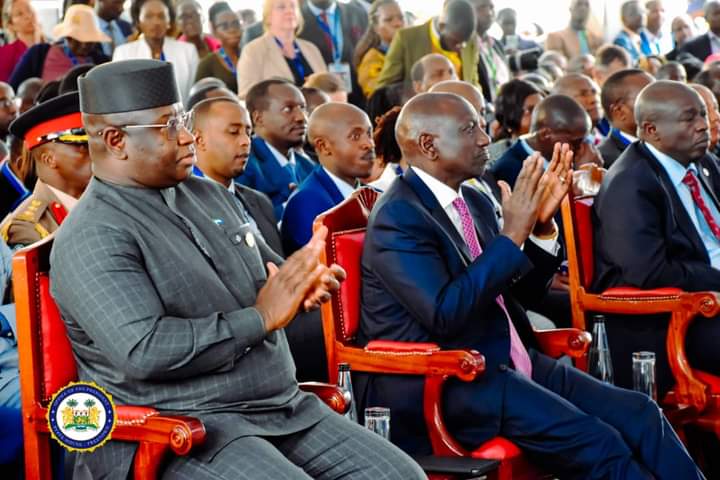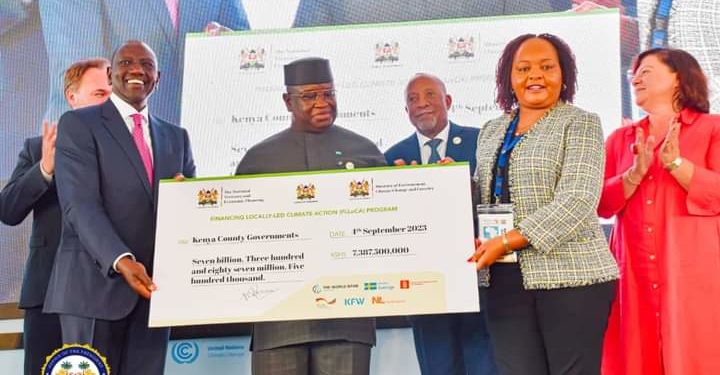Sierra Leone will learn from Kenya and replicate the East African nation’s home grown approach to dealing with the impact of climate change, President Julius Maada Bio has said,
Bio said on the sidelines of Africa’s biggest climate change conference – the Africa Climate Summit – that Sierra Leone faced imminent environmental catastrophe if urgent action wasn’t taken, noting that Kenya’s Financing Locally Led Climate Action (FLLoCA) approach was a “great example of a home grown solution to a home grown problem.”
The FLLoCA is a programme by the Kenyan government designed to enhance the delivery of locally-led climate resilience actions in order to increase communities’ resilience to climate change and other hazards.
Kenyan President William Ruto launched the initiative on Monday on the sidelines of the Africa Climate Summit 2023.

President Bio who is among over a dozen leaders attending the summit graced the sideline event. Bio said he intended to replicate the initiative in Sierra Leone and called for a collaboration through a South-South cooperation to undertake the necessary assessments and formulation of a similar program in Sierra Leone.
“We hope our donor partners will be encouraged to support this learning model among African countries,” Bio said, adding: “such cooperation could shorten the time for the design of various programs. It could also help countries move faster into developing bankable projects to crowd in more significant private investment flow.”
The Africa Climate Summit, the first ever to be convened on the continent, started in the Kenyan capital Nairobi on Monday amid growing concern over the threat posed by the climate crisis on Africa. The three-day even seeks to map out a way for the region to finance and tackle its climate change problems without necessarily relying on foreign partners for funding.
Over 13,000 delegates, among them over a dozen heads of state and government, climate change experts and campaigners, are participating at the event that is jointly organized the African Union and the Kenyan government.
President Ruto heads the Committee of African Heads of State and Government on Climate Change.
“For a very long time we have looked at this as a problem. There are immense opportunities as well,” Ruto said was quoted as he opened a ministerial conference ahead of the summit.
“We are not here to catalog grievances,” he said.
Kenya is considered as a leader in efforts to tackle climate change. It, for instance, derives 90 percent of its electricity needs from renewable energies like geothermal energy, wind and hydropower.
Africa is considered as the most vulnerable to the impact of climate change, even though it is said to be one of the least contributors to its causes. United Nations data show that Africa accounts for only 2 to 3 percent of the world’s carbon emissions.
Sierra Leone is listed among the top 20 countries on the continent most affected by the environmental crisis, as has been illustrated by recurrent disasters in the form of floods, landslides and mudslides, some of which have led to devastating consequences.
According to the agenda of the Africa Climate Summit, the deliberations will conclude with what will be known as the “Nairobi Declaration,” a blueprint for Africa’s green energy transition, which is expected to spell out its position on the climate crisis and how it intends to tackle the problem.
The summit coincide with the Africa Climate Week. And it is being held on the theme: “Driving green growth and climate finance solutions for Africa and the world”.
Africa is said to be losing between $7bn and $15bn annually die to climate change, according to a 2022 UN estimate. That report notes that to help mitigate the effects of climate change on the region, it must raise an average of $124bn annually.
Campaigners and governments are seeking to get richer nations to honour the $100bn-a-year pledge made at COP15 in Copenhagen to help reduce greenhouse gas emissions and help African countries cope with the climate crisis. They also seek to present a united Africa at the next global climate change summit – COP28 – slated for this November in the United Arab Emirates.






















